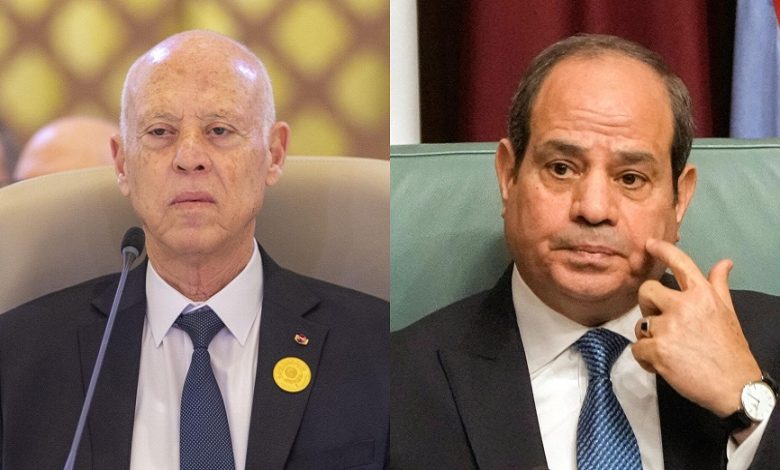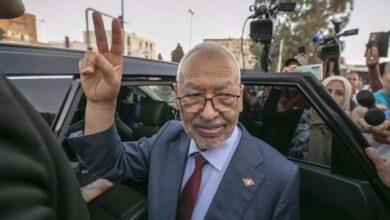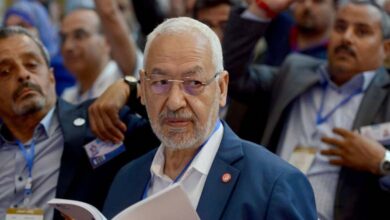Shoukry Conveys a Message of Support for Kais Saied from el-Sisi

The Tunisian President confirms the alignment of positions between the leaderships of Egypt and Tunisia on all regional, and international issues, and challenges, amid a convergence between the two countries since the exceptional measures were taken.
Egyptian-Tunisian relations are at their best period with the political support provided by Cairo to Tunisia under the rule of the current President, Kais Saied. Egyptian Foreign Minister Sameh Shoukry conveyed a message from President Abdel Fattah el-Sisi to his Tunisian counterpart, affirming “Cairo’s support for the measures taken by the latter to achieve stability in his country.”
A statement from the Egyptian Foreign Ministry indicated that the Egyptian Foreign Minister conveyed a message from el-Sisi to Saied during the meeting, which took place on the sidelines of Shoukry’s visit to Tunisia. Shoukry’s visit began on Monday to participate in the 15th session of the Political Consultation Committee between the two countries.
The statement pointed out the “continuous progress in the bilateral relations between the two countries in recent years, and the historic visit made by the Tunisian President to Cairo in April 2021, which represented a qualitative leap in the relations between the two countries.”
The Egyptian Foreign Minister reiterated during the meeting “Cairo’s support and President el-Sisi’s endorsement of the measures and efforts of Saied and the Tunisian state, aimed at achieving stability and development in the country.” On his part, Saied affirmed the “alignment of positions between the leaderships of Egypt and Tunisia on all regional, international issues, and challenges, and his appreciation for the support that Tunisia receives from Egypt in facing all challenges.”
The meeting addressed “a number of regional issues of mutual concern, including the situations in Sudan and Libya, as well as the Palestinian issue, in addition to the issue of illegal migration.” Tunisia has sought to enhance its relationship with Cairo after President Saied took exceptional measures on July 25, 2021.
Egyptian authorities supported Tunisia’s move to break away from the previous decade, which Tunisians describe as a decade marked by corruption and terrorism. Both regimes are opposed to the forces stemming from the Muslim Brotherhood groups, considering the periods of the Brotherhood’s rule in both Egypt and Tunisia as some of the worst times experienced by the countries. In a later video released by the Tunisian presidency, the meeting between Shoukry and Saied at the Carthage Presidential Palace was shown.
The Egyptian Foreign Minister affirmed the “existence of a bilateral political will between Egypt and Tunisia to elevate the bilateral relations to a strategic level.” He added that “the political dialogue between Tunisia and Egypt confirms the presence of a common ground of understanding, desire, and political will for joint action to confront challenges.” He continued that “strategic relations are always based on unity of vision and purpose, and we see all the existing components for the ongoing close coordination and mutual support between the two countries in developmental efforts to confront new challenges.”
The Egyptian Minister noted that “there is harmony in experience and a shared understanding in the importance of preserving the stability of the state and maintaining its economic and social institutions, reaffirming the identity of the state and its institutions.” Earlier on Tuesday, Tunisian Foreign Minister Nabil Ammar discussed with his Egyptian counterpart Sameh Shoukry the cooperation relations between the two countries and regional and international issues. This occurred during the 15th session of the Political Consultation Committee between Egypt and Tunisia, according to separate statements from the foreign ministries of both countries. On
Monday, the Egyptian Foreign Minister began a two-day visit to Tunisia, upon an invitation from his Tunisian counterpart, during which the 15th session of the Political Consultation Committee between the two countries is held “to discuss enhancing relations,” according to a previous statement from the Tunisian Foreign Ministry.












